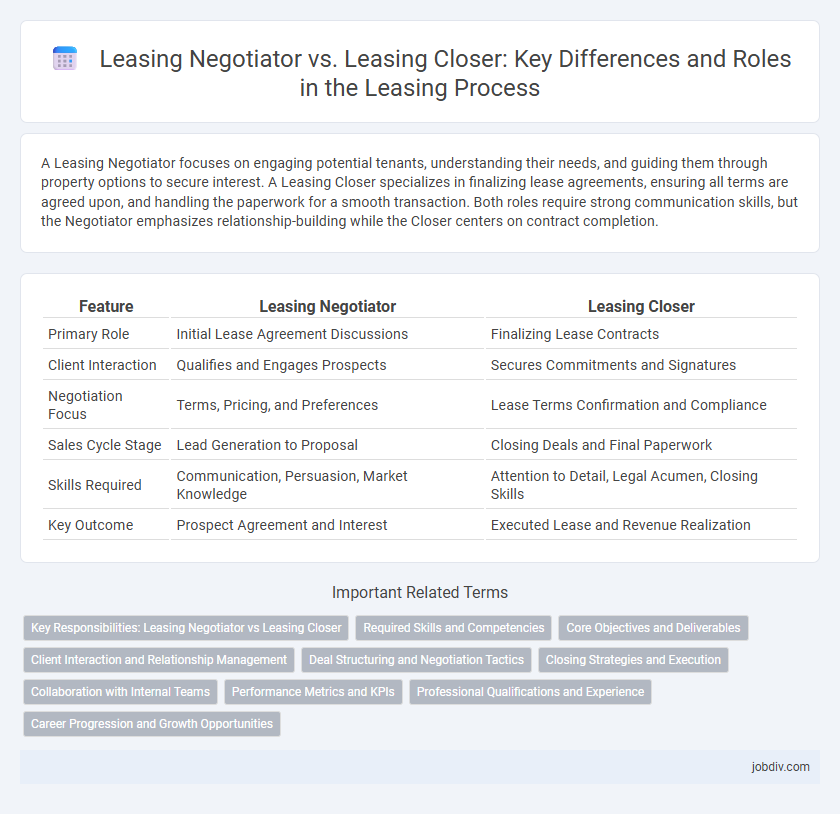A Leasing Negotiator focuses on engaging potential tenants, understanding their needs, and guiding them through property options to secure interest. A Leasing Closer specializes in finalizing lease agreements, ensuring all terms are agreed upon, and handling the paperwork for a smooth transaction. Both roles require strong communication skills, but the Negotiator emphasizes relationship-building while the Closer centers on contract completion.
Table of Comparison
| Feature | Leasing Negotiator | Leasing Closer |
|---|---|---|
| Primary Role | Initial Lease Agreement Discussions | Finalizing Lease Contracts |
| Client Interaction | Qualifies and Engages Prospects | Secures Commitments and Signatures |
| Negotiation Focus | Terms, Pricing, and Preferences | Lease Terms Confirmation and Compliance |
| Sales Cycle Stage | Lead Generation to Proposal | Closing Deals and Final Paperwork |
| Skills Required | Communication, Persuasion, Market Knowledge | Attention to Detail, Legal Acumen, Closing Skills |
| Key Outcome | Prospect Agreement and Interest | Executed Lease and Revenue Realization |
Key Responsibilities: Leasing Negotiator vs Leasing Closer
Leasing negotiators primarily focus on engaging potential tenants, conducting property tours, and addressing preliminary inquiries to generate interest and build rapport. Leasing closers specialize in finalizing lease agreements, ensuring all documentation is accurate and compliant, and facilitating the turnover process for new tenants. Both roles collaborate closely, but negotiators drive lead conversion while closers secure contract execution.
Required Skills and Competencies
Leasing Negotiators excel in strong communication, customer service, and relationship-building skills to engage prospective tenants and answer inquiries effectively. Leasing Closers require advanced sales techniques, contract knowledge, and negotiation prowess to finalize agreements and ensure lease compliance. Both roles demand attention to detail, problem-solving abilities, and a thorough understanding of leasing laws and market trends.
Core Objectives and Deliverables
A Leasing Negotiator primarily focuses on identifying prospective tenants, conducting property tours, and addressing initial inquiries to generate lease agreements. A Leasing Closer concentrates on finalizing lease terms, handling contract execution, and ensuring legal compliance to secure signed agreements. Both roles collaborate to optimize occupancy rates and maximize rental income within the leasing process.
Client Interaction and Relationship Management
Leasing Negotiators initiate client interaction by assessing tenant needs, presenting property options, and addressing initial inquiries to build rapport. Leasing Closers focus on relationship management by finalizing lease agreements, ensuring client satisfaction, and facilitating seamless move-in processes to secure long-term tenant retention. Effective communication skills are critical for both roles, with Negotiators emphasizing persuasive dialogue and Closers prioritizing trust and contract compliance.
Deal Structuring and Negotiation Tactics
Leasing negotiators specialize in deal structuring by identifying client needs and crafting flexible lease terms that maximize property value while ensuring tenant satisfaction. Leasing closers excel in negotiation tactics, using persuasive communication and contract expertise to finalize agreements quickly and secure favorable terms for both parties. Together, their combined skills drive efficient lease execution and long-term tenant retention.
Closing Strategies and Execution
Leasing negotiators focus on relationship-building and presenting options to prospects, employing consultative tactics to uncover tenant needs and address objections. Leasing closers execute targeted closing strategies by creating urgency, offering tailored incentives, and finalizing lease terms to secure signed agreements efficiently. Mastery in closing execution involves precise communication, timely follow-ups, and leveraging legal contract knowledge to ensure seamless lease finalization.
Collaboration with Internal Teams
Leasing negotiators collaborate closely with marketing and property management teams to attract qualified prospects and generate leads. Leasing closers work hand-in-hand with legal and finance departments to finalize lease agreements and ensure compliance with contractual terms. Both roles require seamless communication and coordination to streamline the leasing process and enhance tenant satisfaction.
Performance Metrics and KPIs
Leasing Negotiators primarily focus on performance metrics such as the number of qualified leads generated, initial property tours conducted, and client follow-up rates to optimize tenant acquisition pipelines. Leasing Closers are evaluated based on KPIs including lease agreement conversion rates, average deal closing time, and total revenue secured from signed leases, emphasizing successful contract finalizations. Both roles rely on customer satisfaction scores and occupancy rate improvements to measure overall effectiveness in driving leasing success.
Professional Qualifications and Experience
Leasing Negotiators typically possess strong communication skills and experience in customer service, with a focus on client engagement and property showing; certifications such as Certified Leasing Professional (CLP) enhance their qualifications. Leasing Closers require advanced expertise in contract law, negotiation tactics, and financial analysis, often backed by years of experience in finalizing lease agreements and handling complex transactions. Professional credentials like Certified Commercial Investment Member (CCIM) or specialized training in lease administration improve a Leasing Closer's effectiveness in closing deals successfully.
Career Progression and Growth Opportunities
Leasing Negotiators serve as the initial point of contact, mastering client engagement and property presentation while developing essential communication skills. Transitioning to a Leasing Closer role involves honing expertise in contract finalization, negotiation strategies, and closing deals, marking a significant career advancement. This progression offers enhanced earning potential, greater responsibilities, and opportunities for leadership in property management or sales departments.
Leasing Negotiator vs Leasing Closer Infographic

 jobdiv.com
jobdiv.com